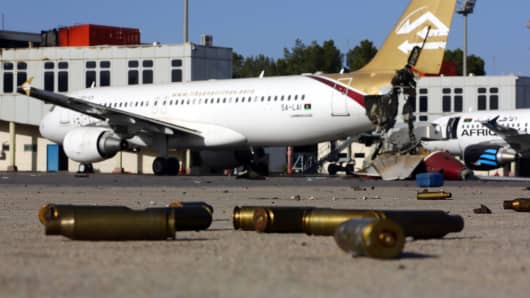Libya is nearing the "point of no return" as warring
factions struggle to agree on a political future for the country, a
United Nations special envoy has warned.
"My opinion is that the country is running out of time. There is dangerous escalation and it is arriving at a point of no return", Bernardino Leon, UN special envoy to Libya, said during a press conference on Tuesday following talks with stakeholders.
"Libyans must sort out their own framework, not the international community".
"My opinion is that the country is running out of time. There is dangerous escalation and it is arriving at a point of no return", Bernardino Leon, UN special envoy to Libya, said during a press conference on Tuesday following talks with stakeholders.
"Libyans must sort out their own framework, not the international community".
Bernardino, a Spanish diplomat who took up the post in
August, has repeatedly called on both sides to agree to a ceasefire.
Despite the persistent fighting in the war-torn country and two rival governments jostling for control, oil production has recovered to 800,000 barrels per day from just 200,000 b/d earlier in the year.
The internationally recognized government under Prime Minister Abdullah Al-Thinni lost control of the capital Tripoli in August, and has taken refuge since in the Eastern city of Bayda.
Read More'Keep us out of civil war': Libya's central bank
On the ground, there was little sign of rapprochement as the rival political leaderships clash over who should govern.This week the Al-Thinni government vowed to set up a new state news agency after its original one, LANA, was taken over by the rebel authorities.
Despite a recovery in oil production, and ambitious output targets of 1.5 million b/d by year-end, concerns about future disruptions loom large.
"There are, however, nagging doubts over the sustainability of Libya's recovery because the country's political situation remains extremely unstable," the International Energy Agency warned in its Oil Market Report for October.
Meanwhile, the International Monetary Fund has also issued a gloomy outlook for the country, forecasting Monday a contraction of 19.8 percent, almost one fifth, in 2014. Some 96 percent of state revenues are derived from oil and gas production.
The report added the authorities would need an oil price of $184 per barrel to balance the budget in 2015, higher than any of its peers in the Middle East and North Africa. A fiscal deficit of 52 percent of gross domestic product was expected for this year.
Read MoreGoldman ordered to pay legal fees to Libyan fund
Libya, home to the largest proven oil reserves in Africa, has already signaled its position on oil prices ahead of a crucial meeting on November 27 in Vienna.
"I would like OPEC to cut production of at least half a million (bpd) as all studies indicate the need for that even before the fall in prices," Libya's OPEC governor Samir Kamal told Reuters last week. "The oversupply is about a million".
Read MoreWhy OPEC's losing its ability to set oil prices
August, has repeatedly called on both sides to agree to a ceasefire.
Despite the persistent fighting in the war-torn country and two rival governments jostling for control, oil production has recovered to 800,000 barrels per day from just 200,000 b/d earlier in the year.
The internationally recognized government under Prime Minister Abdullah Al-Thinni lost control of the capital Tripoli in August, and has taken refuge since in the Eastern city of Bayda.
Read More'Keep us out of civil war': Libya's central bank
On the ground, there was little sign of rapprochement as the rival political leaderships clash over who should govern.This week the Al-Thinni government vowed to set up a new state news agency after its original one, LANA, was taken over by the rebel authorities.
Despite a recovery in oil production, and ambitious output targets of 1.5 million b/d by year-end, concerns about future disruptions loom large.
"There are, however, nagging doubts over the sustainability of Libya's recovery because the country's political situation remains extremely unstable," the International Energy Agency warned in its Oil Market Report for October.
Meanwhile, the International Monetary Fund has also issued a gloomy outlook for the country, forecasting Monday a contraction of 19.8 percent, almost one fifth, in 2014. Some 96 percent of state revenues are derived from oil and gas production.
The report added the authorities would need an oil price of $184 per barrel to balance the budget in 2015, higher than any of its peers in the Middle East and North Africa. A fiscal deficit of 52 percent of gross domestic product was expected for this year.
Read MoreGoldman ordered to pay legal fees to Libyan fund
Libya, home to the largest proven oil reserves in Africa, has already signaled its position on oil prices ahead of a crucial meeting on November 27 in Vienna.
"I would like OPEC to cut production of at least half a million (bpd) as all studies indicate the need for that even before the fall in prices," Libya's OPEC governor Samir Kamal told Reuters last week. "The oversupply is about a million".
Read MoreWhy OPEC's losing its ability to set oil prices


No comments:
Post a Comment